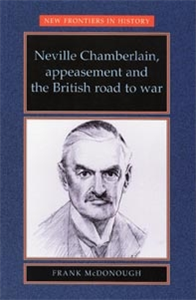Neville Chamberlain, appeasement and the British road to war
by Frank McDonough, Mark Greengrass
Description
More Information
Rights Information
Afghanistan, Aland Islands, Albania, Algeria, American Samoa, Andorra, Angola, Anguilla, Antarctica, Antigua and Barbuda, Argentina, Armenia, Aruba, Australia, Austria, Azerbaijan, Bahamas, Bahrain, Bangladesh, Barbados, Belarus, Belgium, Belize, Benin, Bermuda, Bhutan, Bolivia, Bonaire, Sint Eustatius, Saba, Bosnia and Herzegovina, Botswana, Bouvet Island, Brazil, British Indian Ocean Territory, British Virgin Islands, Brunei, Bulgaria, Burkina Faso, Burundi, Cambodia, Cameroon, Canada, Cape Verde, Cayman Islands, Central African Republic, Chad, Chile, China, Christmas Island, Cocos [Keeling] Islands, Colombia, Comoros, Congo [DRC], Congo [Republic], Cook Islands, Costa Rica, Cote d'Ivoire, Croatia, Cuba, Curaçao, Cyprus, Czech Republic, Denmark, Djibouti, Dominica, Dominican Republic, Ecuador, Egypt, El Salvador, Equatorial Guinea, Eritrea, Estonia, Ethiopia, Falkland Islands [Islas Malvinas], Faroe Islands, Fiji, Finland, France, French Guiana, French Polynesia, French Southern Territories, Gabon, Gambia, Georgia, Germany, Ghana, Gibraltar, Greece, Greenland, Grenada, Guadeloupe, Guam, Guatemala, Guernsey, Guinea, Guinea-Bissau, Guyana, Haiti, Heard Island and McDonald Islands, Honduras, Hong Kong, Hungary, Iceland, India, Indonesia, Iran, Iraq, Ireland, Isle of Man, Israel, Italy, Jamaica, Japan, Jersey, Jordan, Kazakhstan, Kenya, Kiribati, Kuwait, Kyrgyzstan, Laos, Latvia, Lebanon, Lesotho, Liberia, Libya, Liechtenstein, Lithuania, Luxembourg, Macau, Macedonia [FYROM], Madagascar, Malawi, Malaysia, Maldives, Mali, Malta, Marshall Islands, Martinique, Mauritania, Mauritius, Mayotte, Mexico, Micronesia, Moldova, Monaco, Mongolia, Montenegro, Montserrat, Morocco, Mozambique, Myanmar [Burma], Namibia, Nauru, Nepal, Netherlands, New Caledonia, New Zealand, Nicaragua, Niger, Nigeria, Niue, Norfolk Island, North Korea, Northern Mariana Islands, Norway, Oman, Pakistan, Palau, Palestinian Territories, Panama, Papua New Guinea, Paraguay, Peru, Philippines, Pitcairn Islands, Poland, Portugal, Puerto Rico, Qatar, Reunion, Romania, Russia, Rwanda, Saint Barthélemy, Saint Helena, Saint Kitts and Nevis, Saint Lucia, Saint Martin, French part, Saint Pierre and Miquelon, Saint Vincent and the Grenadines, Samoa, San Marino, Sao Tome and Principe, Saudi Arabia, Senegal, Serbia, Seychelles, Sierra Leone, Singapore, Sint Maarten (Dutch Part), Slovakia, Slovenia, Solomon Islands, Somalia, South Africa, South Georgia and the South Sandwich Islands, South Korea, South Sudan, Spain, Sri Lanka, Sudan, Suriname, Svalbard and Jan Mayen, Swaziland, Sweden, Switzerland, Syria, Taiwan, Tajikistan, Tanzania, Thailand, Timor-Leste, Togo, Tokelau, Tonga, Trinidad and Tobago, Tunisia, Turkey, Turkmenistan, Turks and Caicos Islands, Tuvalu, U.S. Minor Outlying Islands, U.S. Virgin Islands, Uganda, Ukraine, United Arab Emirates, United Kingdom, United States, Uruguay, Uzbekistan, Vanuatu, Vatican City, Venezuela, Vietnam, Wallis and Futuna, Western Sahara, Yemen, Zambia, Zimbabwe
Endorsements
Re-examines the controversial policy of appeasement. The text suggests that the mood of the age in British society served to support appeasement, by analyzing the cluster of military, strategic, imperial and economic forces which served to justify it. The book argues that, when Neville Chamberlain came to power, appeasement was part of a broad consensus in British society to avoid a second world war. It provides an interpretation of Chamberlain's conduct by showing how he used and abused the mood of the age to justify a selfish and ambitious policy which was idealogically prejudiced. Yet, when Hitler entered Prague in March 1939, the public mood changed, and Chamberlain found himself a prisoner of a new mood which forced him to make a tactical and half-hearted attempt to stand up to Hitler for which he had no enthusiasm. -
Reviews
Re-examines the controversial policy of appeasement. The text suggests that the mood of the age in British society served to support appeasement, by analyzing the cluster of military, strategic, imperial and economic forces which served to justify it. The book argues that, when Neville Chamberlain came to power, appeasement was part of a broad consensus in British society to avoid a second world war. It provides an interpretation of Chamberlain's conduct by showing how he used and abused the mood of the age to justify a selfish and ambitious policy which was idealogically prejudiced. Yet, when Hitler entered Prague in March 1939, the public mood changed, and Chamberlain found himself a prisoner of a new mood which forced him to make a tactical and half-hearted attempt to stand up to Hitler for which he had no enthusiasm. -
Author Biography
Frank McDonough is Senior Lecturer in Modern Political History at Liverpool John Moores University
Manchester University Press
Manchester University Press is a leading UK publisher known for excellent research in the humanities and social sciences.
View all titlesBibliographic Information
- Publisher Manchester University Press
- Publication Date January 1998
- Orginal LanguageEnglish
- ISBN/Identifier 9780719048326 / 071904832X
- Publication Country or regionUnited Kingdom
- Primary Price 27.95 USD
- Pages196
- ReadershipGeneral/trade
- Publish StatusPublished
- Dimensions216 X 138 Millimeters
- SeriesNew Frontiers
- Reference CodeIPR4669
Manchester University Press has chosen to review this offer before it proceeds.
You will receive an email update that will bring you back to complete the process.
You can also check the status in the My Offers area

Please wait while the payment is being prepared.
Do not close this window.



